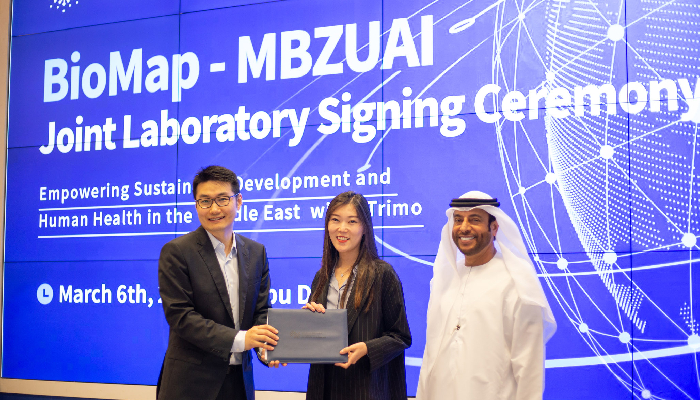From Personalized Digital Therapeutics to Personalized Medicines, Abu Dhabi is Unleashing the Potential of AI for Good.
Thanks to a series of recent healthcare industry partnerships and collaborations, the UAE’s Mohamed bin Zayed University of Artificial Intelligence (MBZUAI) is shining a very public light on its unique mission to undertake significant research that seeks personalized solutions aimed at advancing society.
In March, MBZUAI and IBT joined forces in a five-year R&D agreement that will see the two parties form a joint research lab to develop personalized digital therapeutics for human brain health by optimizing the power of AI technologies.
The collaboration looks to capitalize on IBT’s capacity in developing and commercializing digital therapeutics alongside MBZUAI expertise in AI, with the ultimate goal of realizing powerful, personalized brain and mental disorder treatments. Such a personalized approach to mental health treatment is quite an ambitious goal, given that the World Health Organization (WHO) estimates that more than one in eight people in the world, roughly one billion people, suffers from some type of mental illness, from depression and anxiety to schizophrenia, according to WHO’s World mental health report: Transforming mental health for all.
Earlier in the month of March, MBZUAI announced a historic memorandum of understanding (MoU) with BioMap, a disruptive super-scale AI model-powered life science platform, to establish a biocomputing innovation research laboratory that will be a first-of-its-kind in the Middle East.
As per the MoU, the two parties have agreed to focus on creating breakthroughs in AI-generated proteins (AIGP) in line with the demands of the Middle East’s most pressing needs in medical health, drug design, and other critical areas. Harnessing joint capabilities, both MBZUAI and BioMap aim to explore new technologies to advance protein generation, protein structure prediction, cell function prediction, and other foundational life science challenges.
One such challenge is aging-associated diseases, as the WHO estimates that the global population of those aged 60 years and older will double to 2.1 billion by 2050. MBZUAI and BioMap have agreed to collaborate using large-scale AI models for multi-omics pre-training to accelerate the discovery of drug targets for aging-associated diseases, enabling the development of personalized treatments.
In January 2023, MBZUAI reached an agreement with Quris-AI to develop a world-class bio-AI center in Abu Dhabi, a state-of-the-art facility to support the faster development of safer and more highly personalized medications tailored specifically to diverse populations of the Middle East and North Africa region.
Quris-AI ensures the safety and efficacy of new drugs by revolutionizing the drug development process, pioneering clinical trials on chips – testing thousands of novel drug candidates on hundreds of miniaturized “patients-on-a-chip”.
Currently, around 90 percent of clinical trials for new medications end in failure, say Quris-AI executives, but their proprietary “patients-on-a-chip” technology promises to reduce loss by predicting which drugs are most likely to work in humans. The Quris-AI system rapidly performs test interactions using predictive AI technologies that simulate genetically diverse patients, eliminating the need for animal testing and avoiding the risk and cost associated with failed clinical trials.
Tomorrow’s personalized global healthcare solutions are being made possible through leading-edge AI research projects being conducted today in Abu Dhabi, but being done so in partnership and collaboration with some of the world’s most innovative companies and the minds who comprise them. Now, that is an education for all future leaders of AI research and innovation.

